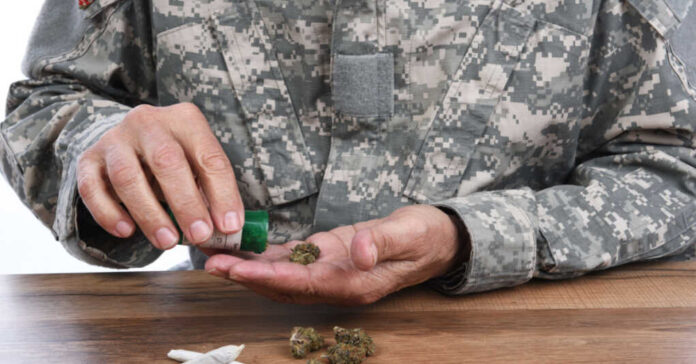
A rare bipartisan effort is underway to help save veterans from the exorbitant costs of obtaining their medical marijuana recommendations. Titled the “Veterans Equal Access Act,” the bill is being chiefly sponsored by Reps. Brian Mast (R-FL) and Earl Blumenauer (D-OR).
These co-chairs of the Congressional Cannabis Caucus have been trying along with other members of the caucus to get similar bills through over the last few years. Yet despite bipartisan support, it has failed time after time. From semantics to wording someone found unclear, the reasons to deny the idea have been endless and consistently foolish.
Under this bill, doctors with the US Department of Veterans Affairs (VA) would be permitted to issue a recommendation for medical marijuana to patients in states where it is legal. While the VA itself would not provide veterans with cannabis in any form, veterans could take that recommendation to legal dispensaries in their state.
Mast himself is a disabled veteran, having lost both legs while serving in Afghanistan. During a press conference on March 30th, he was asked by Marijuana Moment about the situation and he said “there’s absolutely progress going on, and I do have high hopes of policy and legislation moving,” especially now that the GOP is running the House. He stated that during conversations with Republican leadership, he noticed that cannabis reform absolutely “touches every committee” as well as “every member” of Congress.
Blumenauer also spoke up at the press conference about the bill. He told reporters this “isn’t just low-hanging fruit—it’s picking it up off the ground.” He could not be more correct. This idea is long past its time, and it’s something the veteran community will greatly benefit from. Given the history of it failing to get through committee, or even through appropriations as an amendment, it’s obvious that this is something people want, but they want it their way.
Meanwhile, the VA has been nothing but troublesome about the idea. From claiming doctors would be blamed if a veteran was prescribed marijuana, to now barely being willing to talk to them about the idea. Back in 2019 Blumenauer was close to having it pass but pulled back at the last moment due to the VA objection.
“I have been working in this Congress to extend [medical cannabis access] to our veterans who, if anything, need medical marijuana more than any other category of our citizens. We lost 7,000 people to the wars in Afghanistan and Iraq, but we’ve lost 100,000 of those veterans to suicides and opioid overdoses. The VA, I’m afraid, has not been as helpful as it should be.” The sudden worry about putting doctors at risk is yet another example of the bureaucracy and problems the VA faces.
Aside from a potential drop off in opioid prescriptions, a 2020 Congressional Budget Office analysis deduced that it would cost the VA nothing to implement. This kind of change would mean better allocation of funding to help veterans in other ways and could help stop the addiction crisis that is currently plaguing many veterans.
This measure could also pave a clear path about the mixture of medical cannabis and exercising your rights under the Second Amendment. Given the way many organizations interpret a doctor’s recommendation and your right to bear arms, there is a lot of confusion. Out of this confusion comes a great many who claim that you cannot have both. Yet as it is a doctor’s recommendation, it is beyond the scope of the state due to HIPPA. By ensuring the VA could recommend cannabis, a clear answer would become a true necessity.
For veterans and their families, this bill could prove to be a dream come true. Many veterans are on too tight of a budget to pay the high cost of the doctors and state offices. While dispensaries always have a deal, the doctors don’t, nor does the state. Giving them the recommendation for free is the least the VA can do. Especially since they are currently mulling over the idea of dropping the disability payments for many veterans.







